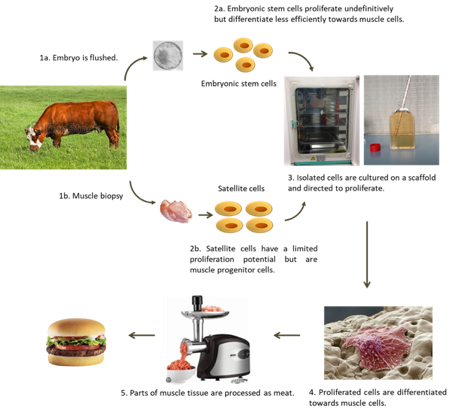Stem cells to produce cultured meat
Healthy and sustainable food provision for a continuously growing human population is one of the major challenges for the next decades. Although current meat production systems are under pressure because of their environmental impacts, high-quality proteins and several micronutrients are present in meat. Therefore, there is an urgent need to develop alternative food production methods such as cultured meat.
Traditionally, satellite cells are used to produce cultured meat as these skeletal muscle stem cells serve in vivo as a robust cell source for skeletal muscle repair (Figure 1). Their proliferation potential in vitro, however, is limited. Expansion through 20 doublings has been described, but this is insufficient to produce cultured meat.

Figure 1. Overview of the production process of cultured meat using two different cell sources, i.e. embryonic stem cells and satellite cells.
To explore the potential of alternative cell sources like embryonic stem cells and mesenchymal stem cells (MSCs) to produce cultured meat, we are part of an interdisciplinary team consisting of researchers from Ghent University (Faculty of Bioscience Engineering; Faculty of Veterinary Medicine; Faculty of Medicine and Health Sciences; Faculty of Sciences) and KU Leuven campus Kortrijk (Tissue Engineering Lab). We, in particularly, want to explore the potential of bovine MSCs as a source for in vitro meat production.
